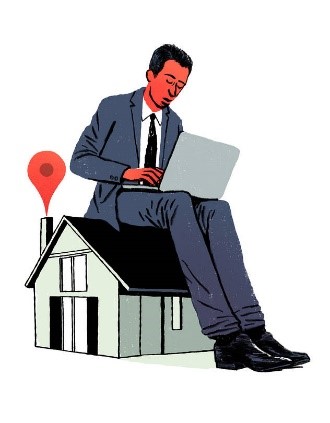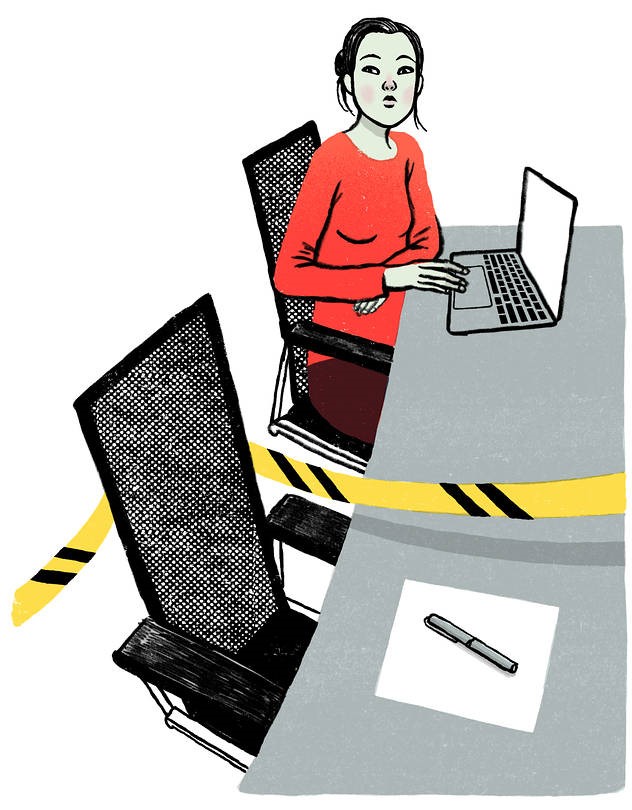The new coronavirus’s spread is taking the relationship between employers and their workers into new territory—one in which both sides are trying to sort out their rights and responsibilities in containing the outbreak.
Caught between trying to keep the virus out of their workplaces and minimizing business disruptions, employers are issuing all sorts of edicts unthinkable just weeks ago, from worker quarantines to officewide remote work and even personal-travel reporting requirements.
Many employees, meanwhile, are wondering just how far their bosses have to go to protect them from the outbreak’s spread, and what calls go too far.
To better understand what is permissible—and required—in confronting a public-health crisis in the workplace, The Wall Street Journal consulted employment lawyers and other workplace experts. The answers often lie somewhere in the murky balance between the Americans with Disabilities Act, or ADA, which aims to safeguard individuals’ privacy, and Occupational Safety and Health Administration standards, designed to protect workers’ safety. But the body of labor rules and regulations suggest it’s wise to stick to the following guidelines, the experts say.
Here are answers to some of the most common questions from employees:
Personal travel
Can my employer cancel my vacation time and make me work instead?
In most workplaces, yes. Vacation time isn’t guaranteed under federal law, and most employers are within their rights to cancel a vacation and require workers to return to the job, says Kenneth G. Dau-Schmidt, a professor of labor and employment law at Indiana University Bloomington. The exception is if an employee is covered by a union contract or specific employment agreement that includes certain time-off protections, he says.
Still, most bosses know that pulling a vacation is bound to be an unpopular move, a reason many are loath to do it unless an emergency requires it. “People can get upset if vacations are canceled,” Prof. Dau-Schmidt says. “That would be the major limit on it.”
What if my boss tells me to cancel my personal travel plans. Is that legal?
Employers can’t dictate how you spend your personal time, even if they do make a recommendation against travel to certain regions, says Roberta Matuson, an executive coach and author of “Evergreen Talent: A Guide to Hiring and Cultivating a Sustainable Workforce.”
Does the company have to pay for a canceled trip?
If a boss insists on an employee cutting a trip, go ahead and ask for reimbursement. Some employers will see that as a reasonable request. But legally, they aren’t required to pay unless an employment contract specifically calls for it, Mr. Dau-Schmidt says.
Working remotely
I really feel uncomfortable about commuting into work and increasing my risk of exposure. Do I have the right to work from home?

Source: MARTIN TOGNOLA, The Wall Street Journal
Employers generally don’t have an obligation to allow telecommuting, says Mitch Boyarsky, a labor and employment lawyer with Nelson Mullins Riley & Scarborough LLP. An exception is an employee who qualifies under the ADA to work remotely to accommodate a disability. Another might be if the government is ordering a quarantine, other lawyers say. Then an employer could have more of a burden to allow remote work.
I feel totally fine and don’t think I’m at risk, but my boss is insisting I work from home. Do I have to?
Yes. Employers are within their rights to ask employees to work remotely, as long as they’re not applying a policy in a way that could be deemed discriminatory, says Angela B. Cornell, a clinical professor at Cornell Law School and director of the school’s Labor Law Clinic.
For example, it’s OK to ask workers who have recently traveled to China, Italy, Iran or another country especially hard hit by the outbreak to work from home for a given period. But it’s not all right to ask workers over the age of 70 to work from home—even if the intentions are well-meaning—because age is a protected class under federal law.
My employer has requested that I work from home. Does that mean they can order me not to run errands or go to church?
While your boss can ask you not to come into the office, they can’t bar you from going to other places or, say, hopping on the subway. That said, your employer can offer recommendations on how much to venture from home, says Heather Bussing, an employment lawyer in Sonoma County, Calif., with Rybicki & Associates PC.
“You can educate and you can encourage, but you can’t control,” she says of employers.
On the job
My job requires me to have a lot of close contact with many customers. Am I protected if I say I can’t perform my job because of the outbreak?
Workers are protected from retaliation from an employer if they refuse to take on what they consider an unsafe work assignment, says Howard Mavity, an Atlanta-based partner in the workplace-safety practice of law firm Fisher & Phillips LLP. He advises employers to listen carefully to employee concerns. “You can’t discipline someone for complaining about safety,” he says.
It becomes less straightforward, though, if a “reasonable” employee would otherwise deem the assignment safe, Mr. Mavity says. If a hotel housekeeper, for example, has received the necessary training to protect against Covid-19, along with proper gloves and equipment, it may not be considered reasonable to refuse to clean a hotel room. “That wouldn’t really be protected,” he says.

Source: MARTIN TOGNOLA, The Wall Street Journal
If a hotel is known to be housing guests with Covid-19, it’s a different story, and housekeepers might be able to refuse the assignment, he says.
Do I have to take that business trip?
Minnesota employment lawyer Kate Bischoff says your boss can require you to go on a business trip.
“There can be the ultimatum that you have to go on this or you can lose your job,” she says.
Her advice for workers: Come up with a strong case for how technology could make a virtual meeting effective. For employers, she urges caution. “Making such an ultimatum is going to spread like wildfire through your organization,” she says, prompting lots of workers to rethink their ties to the company. “It is a strategic mistake.”
It could also be a legal mistake, depending on the circumstances. Daniel Schwartz, a partner with law firm Shipman & Goodwin who mainly represents Connecticut employers, points to a case in Connecticut where the court indicated it could be illegal to require a worker to travel somewhere unsafe.
Can my employer take my temperature at work?
The Equal Employment Opportunity Commission says that, according to the Americans with Disabilities Act, measuring an employee’s temperature generally is considered a medical examination, and usually beyond the bounds of what an employer can do or require. But in an especially severe or widespread influenza outbreak, such a check is permissible. That rule is likely to apply to a coronavirus epidemic as well.
But even if it’s legal to take an employee’s temperature, many lawyers and health experts don’t think it’s useful. “Maybe they have the flu,” Mr. Schwartz says of employees with elevated temperatures. And health officials have said many people with the coronavirus have had no fever.
What if I end up catching Covid-19 at work? Is my employer liable?
Unlikely—because it’s usually hard to prove. If an employee suffers an injury on the job, such as slipping or falling, then the worker is often entitled to workers’ compensation, which can cover certain medical care and lost wages, says Ms. Cornell.
But with the coronavirus, it could be tough to determine exactly where someone contracted the virus, making it difficult to hold an employer responsible for medical costs. Generally, a staffer must prove that the disease was caused by “conditions peculiar to the work” and there were no other opportunities for exposure, according to guidance by Fisher & Phillips to employers.
Privacy
My employer knew a co-worker contracted the virus but didn’t inform the rest of staff right away. Weren’t they required to?

Source: MARTIN TOGNOLA, The Wall Street Journal
Generally, yes. Companies have an obligation to warn those who may have come in contact with someone diagnosed with Covid-19, says Ms. Cornell. Local health authorities may also want the public to know.
But it’s highly unlikely a company would identify the employee in question by name. That could violate confidentiality requirements under the ADA, Mr. Mavity says.
Instead, employers are more likely to note that a staffer on a certain floor or part of the building contracted the virus. “It will take about a 12th of a second for everyone to know you’re talking about Joe, but you don’t say Joe,” Mr. Mavity says.
If I come down with Covid-19, do I have to tell my employer? Can’t I just say I need to take sick time and leave it at that?
There may not be a legal requirement, but there is an ethical one, Ms. Matuson says. If you work in an office or interact with colleagues in person, it’s a good idea to alert your company to your diagnosis so managers can tell others.
If you work remotely and have had no direct contact with colleagues, clients or other people through your job, though, such a disclosure may not be necessary, Ms. Matuson says. “I would just say, ‘I’m not feeling well,’ ” she says.
Source: The Wall Street Journal, March 12, 2020 | Rachel Feintzeig and Chip Cutter